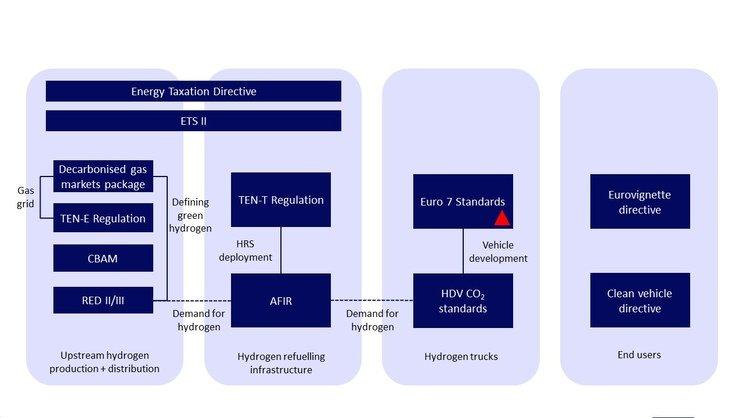H2Accelerate joint policy position
The H2Accelerate joint policy position sets out the current landscape of European policies impacting the hydrogen and heavy-duty vehicle sectors, and the joint H2Accelerate position on key policies, namely: RED, AFIR, the HDV CO2 Standards, and Euro VII. As a principle, H2Accelerate members support ambitious and binding targets for the relevant policies for hydrogen trucking, provided these policies are implemented stepwise and such that the timescales for scaling deployment of hydrogen production, refuelling, and trucks are aligned. Further, policy should aim to support the financial case for hydrogen trucking in order to encourage end users to purchase the vehicles and so as to prevent a step change in the cost of freight services.
Specifically, the position paper states that the measures implemented should ensure:
- At least 1.0 Mtonne per annum of green hydrogen could be available for the transport sector at a cost that allows competitiveness with diesel.
- Infrastructure players develop a pan-European network of at least 1,500 2+ tonne/day, high reliability hydrogen refuelling stations that are able to meet the specific needs of trucking end users, with a fuel cost that is competitive with diesel alternatives.
- Vehicle OEMs manufacture at least 50,000 heavy-duty hydrogen vehicles by 2030, which meet the performance requirements of end users, on timescales that are aligned with the deployment of this infrastructure.
- End users are financially incentivised to purchase the vehicles through policy which creates cost of ownership parity (as a minimum) with diesel vehicles.
Recent policy developments
The past few months have seen a number of key policy developments; in March, agreement was reached on the Alternative Fuels Infrastructure Regulation (AFIR), with a maximum distance between hydrogen refuelling stations of 200km on core TEN-T networks. A draft agreement text on the Renewable Energy Directive (RED) was also published, with a combined target for renewable fuels of non-biological origin and biofuels of 5.5% in the transport sector by 2030.
In February the long-awaited RED II Delegated Acts setting out the sources of electricity that can be used to produce green hydrogen were published by the European Commission. The adoption of these acts into law is expected to provide the clarity that green hydrogen producers need to be able to make investment decisions on electrolysis projects.
Further, on February 14th, the Commission published a proposed update to the Heavy-Duty Vehicle CO2 standards, which would set a target of 45% emissions reductions from heavy duty fleets by 2030, and a 90% reduction by 2040. This proposal came in contrast with the outcome of negotiations on AFIR and its minimum requirements for hydrogen infrastructure, which will need to scale up as demand from mobility evolves.
Previous analysis – the need for policy
In September 2022 the H2Accelerate collaboration published a whitepaper on the cost of ownership for fuel cell trucks, and the policy support needed to enable their deployment. This analysis showed that financial policy support will be needed to enable the economic case for hydrogen trucking until at least 2030. The collaboration expects that a combination of capital funding, differential road tolls through the Eurovignette Directive, and carbon tax can bridge the ownership cost gap between hydrogen and diesel heavy-duty vehicles.
Enabling a favourable ecosystem for hydrogen trucking
The alignment of targets on deployment scale and timelines across a number of policy mechanisms, alongside their coherent implementation across member states, is vital to enable to business case for hydrogen trucks and infrastructure. This, in addition to enabling conditions such as the deployment of a functional definition and guarantee of origin scheme for green hydrogen and refuelling standards for the fast and safe refuelling of hydrogen trucks are required to allow the sector to reach full maturity. This will allow Europe’s climate target to be met on time and in a way that minimises the financial impacts of the energy transition on end users of freight services.
About H2Accelerate
H2Accelerate is a collaboration agreement signed between the participants under which the participants will work together to:
- seek public support to fund early pre-commercial projects to activate the market on the path towards a mass market roll-out;
- communicate around the technical and commercial viability of hydrogen fuelled trucking at scale; and
- hold discussions with policymakers and regulators to encourage policies which can support a sustainable and speedy activation of the zero emissions long haul trucking market.
You can follow the H2Accelerate collaboration on Twitter (@H2AccelerateEU).
IVECO Magirus AG
Nicolaus-Otto-Straße 27
85716 Ulm
Telefon: +49 (89) 31771-0
Telefax: +49 (89) 31771-462
http://www.iveco.com
Telefon: +49 (160) 9045-8356
E-Mail: patrick.wanner@iveco.com
![]()

